Indiana NRCS Helps Solve Waste Storage Issues on Farm
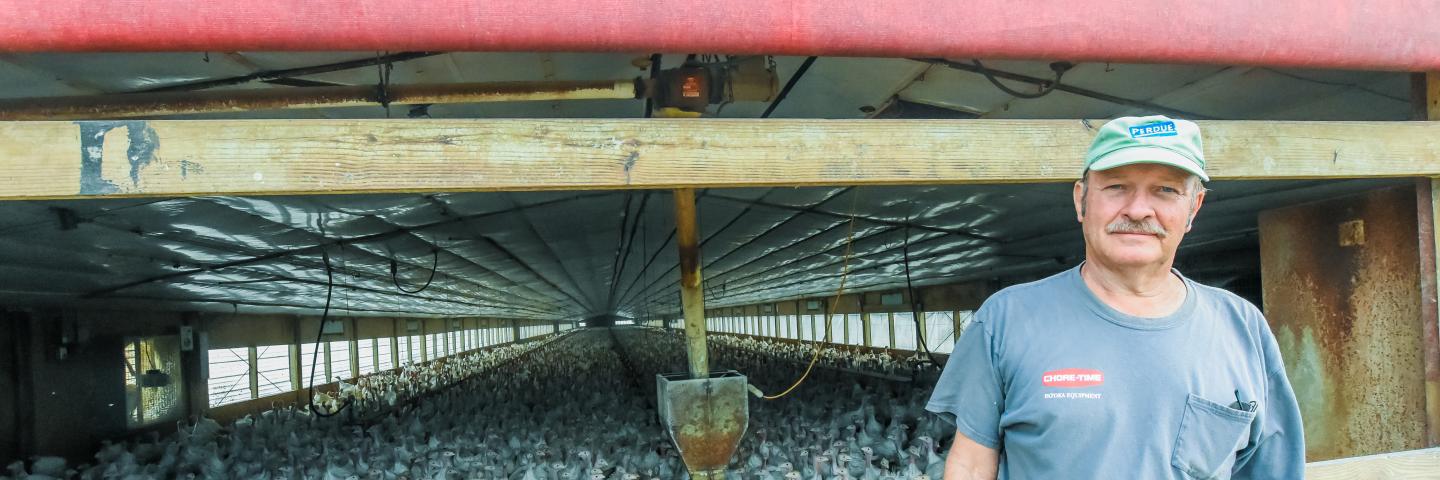
Indiana NRCS worked with turkey farmer Kenny Lecocq to address waste storage issues on his farm through EQIP
By Brandon O'Connor, Public Affairs Specialist, USDA-NRCS, Indianapolis
With a double rainbow decorating the horizon and blue skies just starting to peak out from behind the rain clouds that had drenched his farm in Pike County, Indiana off and on throughout the morning, Kenny Lecocq walked toward one of his turkey houses, coffee in hand.
Waiting for him in the house on the chilly October morning following the rainstorm, were newly arrived turkeys that had only been delivered a week before. Pulling on a chain, Lecocq raised the red canvas door covering the entrance. As the sound of the door opening echoed through the house, 6,500 turkeys turned their heads toward the entrance. White birds, only about 6-weeks-old, stretched for nearly two football fields as those closest to the door walked forward to inspect the source of the noise.
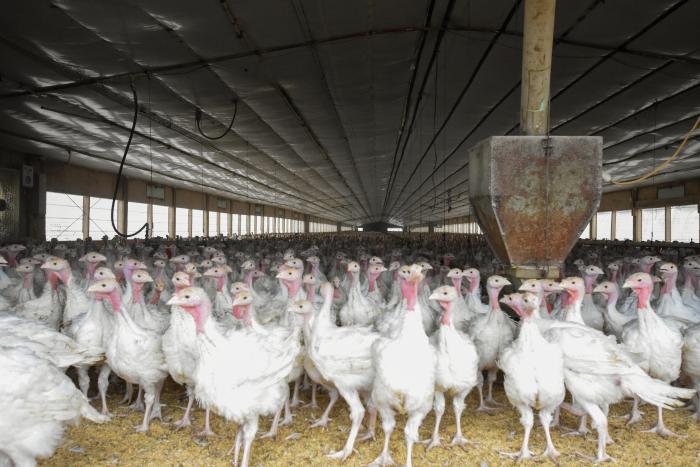
Tending to his 20,000 turkeys spread throughout three houses is a seven day a week job for Lecocq, as it has been for the past 24 years. Rain or shine, he wakes up at 5 a.m., drinks his coffee and then makes his way out to the farm to tend to the birds.
Turkey farming started as a second job for him to go along with his full-time career as a toolmaker and the first bird arrived on his farm in July 1996. The plan, originally, had been to raise chicken like his grandfather before him. As he began researching, he was put in contact with Perdue Farms by a friend who raised turkeys for them, and he decided to go with turkeys instead.
After retiring from his toolmaker position, Lecocq switched to turkey farming full-time and grew his operation from 12,500 brooding turkeys to 20,000 birds per flock in the finishing stage of their development. A calendar year will see him raise about three and a half flocks of turkeys, raising them from just under 6-weeks-old to about 20-weeks-old.
His son Dewayne has joined the business too, raising 6,500 brooding turkeys per flock in the first stages of their life. His cycle is shorter, so he goes through four flocks a year.
As the two operations grew and more than 100,000 birds started coming through the farm each year, waste storage became an issue for the Lecocqs.
The cycle of their flocks required that some of the turkey houses had to be cleaned out during the winter when it wasn’t possible to immediately turn the manure into fertilizer and spread it on a field. He found his answer through the help of the Natural Resources Conservation Service (NRCS).
Looking back more than a decade, Lecocq can’t quite remember how he got in touch with the NRCS, but in the years since they have become his problem solvers, helping with his waste management and other issues on the farm. As his operation grew and his needs for storage did too, he partnered with the agency to build not one, but two manure storage facilities. Working with his NRCS district conservationist he has also started using cover crops on the 300 acres of adjacent farmland his cousin operates for him and created grassed waterways to solve erosion problems occurring in the field.
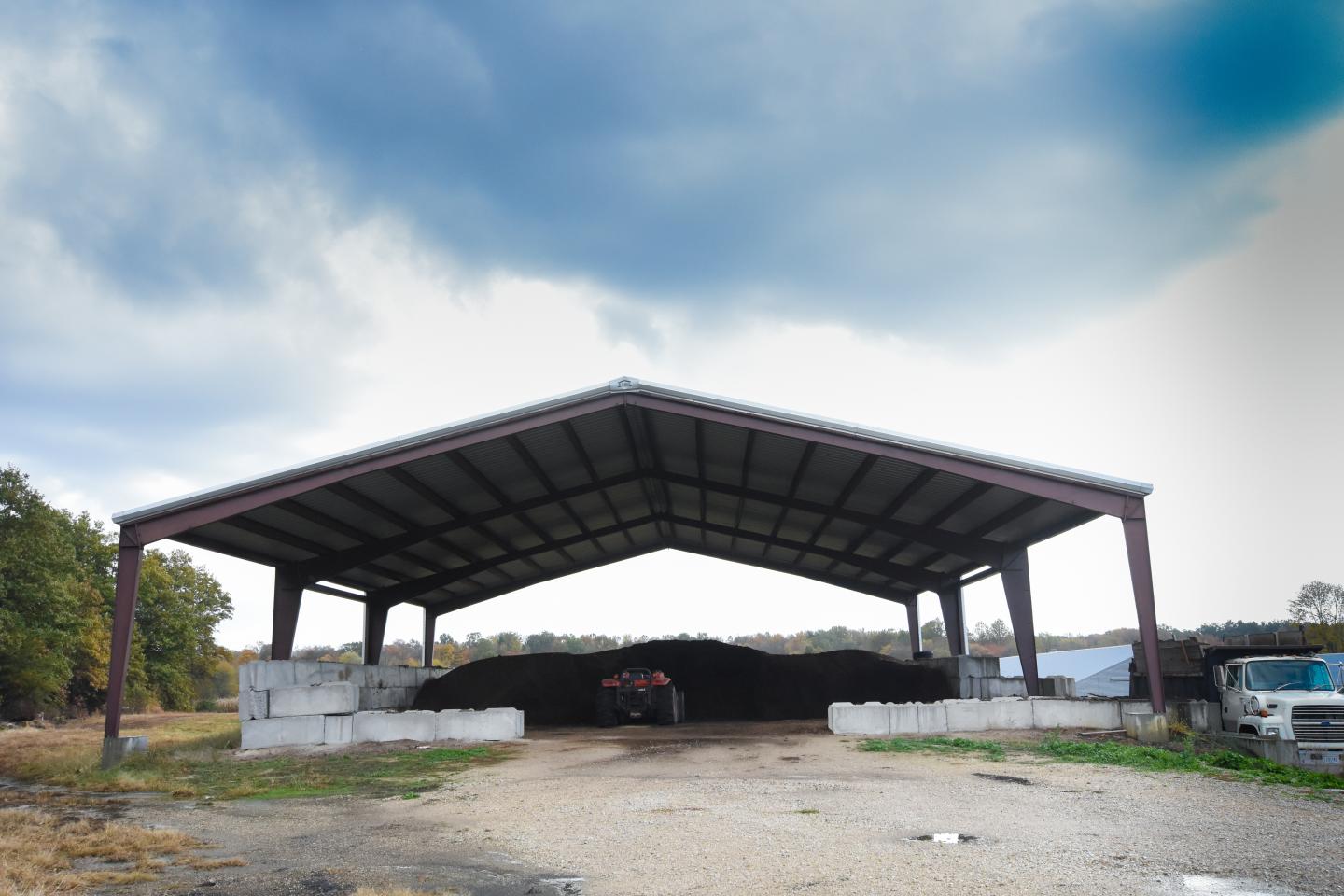
“It seems like they're always here to help whenever we have a problem,” Lecocq said. “So, it's worked out great I think.”
Lecocq started his relationship with the NRCS by enrolling in the Environmental Quality Incentives Program (EQIP), which helps farmers by providing financial assistance and technical advice to assist them in implementing conservation practices on their land. His first EQIP contract was signed under the 2002 farm bill and helped him build the first of his manure storage facilities as part of a comprehensive waste management plan. The storage facility was completed in 2007 and can hold the waste from one and a third of his turkey houses. The facility enabled Lecocq to store manure over the winter and during other seasons a farmer in Dubois County collected the waste to use as fertilizer on his farm.
The facility worked for a while, but as his turkey operation continued to grow, Lecocq began looking for another way to store the manure.
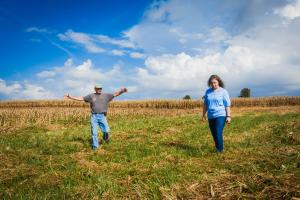
So, much like when he ran into his first waste management issue, Lecocq turned to the NRCS to help. Working with the district conservationist and agricultural engineer, he signed another EQIP contract which was used to build a new, larger manure storage facility. Completed in 2018, the new facility can hold two full barns worth of waste and still have room for equipment to move around. In all, he estimates the new facility can hold upwards of 800 tons of manure, which they then use to fertilize the roughly 300 acres of farmland surrounding the turkey operation.
Constructing the waste storage facility and having a safe, legal way to store the manure would not have been possible without the help of the NRCS and the EQIP contract, Lecocq said, because a project of that scale is too expensive on his own. And with the ability to store the manure and then use it, the positive benefits have been spread throughout the entire farm.
“What I've seen is it's just a big circle. That's really helpful for the farmer,” Lecocq said. “We can tell by the yields and the way it's helped this strip ground dirt ... The yields have gone up because it's building the topsoil and it's adding the stuff that we need. We're seeing that we're not having to put down the lime as much and stuff like that.”
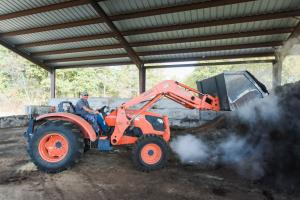
Lecocq has also relied on the USDA to help fix issues with erosion throughout his farm and in 2012 he signed a Conservation Reserve Program (CRP) contract with the Farm Service Agency. Through his CRP contract, Lecocq installed grassed waterways in his fields in 2013, underground outlets and more to help rectify the erosion occurring on his fields. The measures took about four acres of his farm out of operation in total, he said, but the tradeoff has been worth it as he has seen the erosion problems disappear. He will also be planting cover crops for the third consecutive season to further improve the health of his soil and manage nutrients.
“During this time of year, the land is freezing and thawing which causes erosion. We don't want erosion in our fields. We want to keep our ground as stable as possible,” Lecocq said. “The waterway has worked great. We don’t have erosion in that field any longer. We once used to have three-foot-deep ruts down through there and now we don't have any.”
In the 13 years since he started working with the NRCS, Lecocq said he has found the agency to be a group of people he can turn to anytime he has an issue. He has plans to set up another meeting soon to talk through an additional problem he is having with some of land and see what can be done.
“It's just been great to work with them,” he said, “because anything that needs to be done, they were there to help me with.”
Additional Information
Environmental Quality Incentives Program - Indiana
The Environmental Quality Incentives Program (EQIP) provides financial and technical assistance to agricultural producers and non-industrial forest managers to conserve natural resources while strengthening their operations.
Learn MoreCONSERVATION RESERVE PROGRAM
The Conservation Reserve Program is a land conservation program administered by USDA’s Farm Service Agency with technical assistance provided by USDA’s Natural Resources Conservation Service
INDIANA NRCS HOMEPAGE
For more information about NRCS programs offered in Indiana and how experts throughout the state can help you address natural resource concerns on your land, visit the Indiana NRCS homepage.

